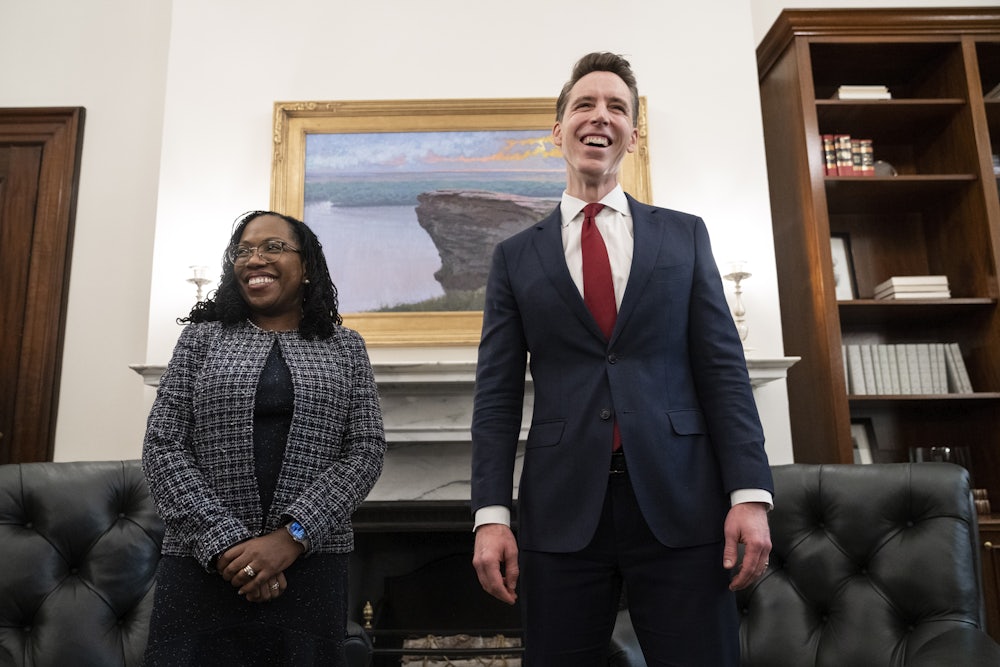As Judge Ketanji Brown Jackson faces her fourth Senate confirmation hearing, this one holds the powerful significance of just what a plural democracy means. We all know that if confirmed, she will be the first Black woman appointed to the Supreme Court, and she will also be the first person with a background as a criminal defense attorney. She may also be the first historic nominee to be appointed with little to no bipartisan support. And that would be a shameful signal for democratic politics.
The stakes for democracy are high because we are at war with ourselves over what it means to belong and how our complicated and difficult history make us feel. We have different experiences based on our race, our gender and sexual identities, and many other factors. Yet we have been witnessing a systematic attack even on an exploration of our different experiences, from book banning to opposing a highly qualified nominee. How can we confront these tensions on a Supreme Court that lacks a range of expertises and experiences and that fails to model how we do that?
Lawyers are trained to think analytically, examine all sides of an argument, try to understand impacts, and work to persuade from there. These are critical democratic tools that are not and should not be reserved to lawyers. And certainly we should hope for that sort of behavior in our politics.
Ruth Bader Ginsburg famously befriended her ideological nemesis, Antonin Scalia. She credited him with making her opinions better, sharper, and more thoughtful. We should not fear disagreement if we are approaching it with an openness to understanding something outside of our own experiences. It is important that when we do disagree, we are willing to take into account any legitimate concerns we hear that make the rules more workable or clear. Those experiences are ones that Republicans and Democrats alike have to embrace to move legislation and to govern. Doing so requires fact-based inquiry and intellectual honesty.
Unfortunately, as the confirmation hearing process heats up, we are witnessing the type of clickbaity and cringeworthy attacks that distort Jackson’s record in an effort to make her appear a dangerous and fringe actor. Missouri GOP Senator Josh Hawley has laid out a line of attack based on Jackson’s knowledge of abusive sentencing guidelines that are excessive. He has used that to make her seem a protector of pedophiles. He selectively ignores facts that undermine his argument, like her denial of compassionate release to a convicted pedophile.
Will other, more moderate and experienced legislators pick up on this dishonest attack that stereotypes a Black woman attorney with a criminal defense background? I hope not. Senators know that Jackson is the most vetted high court nominee to appear before them in ages or perhaps ever, since it’s her fourth judicial confirmation and second in a year.
But confronting and allaying public fear of difference matters if we are to work to move together through disagreement. The Supreme Court is supposed to be above politics and to render decisions based on facts and law. Jackson, if confirmed, will join a court that has decided to hear two challenges to diversity in college admissions, including at her alma mater, Harvard University. She attended Harvard College and law school and served on the Harvard Law Review, a coveted sign of academic excellence. I can speak as a Black woman who attended Ivy League institutions that we have complicated experiences with them and their admissions. This experience counts, and to ignore it is to pretend that those who have benefited from older and more discriminatory regimes are more neutral. They are not.
Diversity on the bench has helped to inform opinions in important ways. President Reagan appointed Justice Sandra Day O’Connor as the first woman on the Supreme Court. She penned the last major affirmative action ruling back in 2003, finding that universities could take race into account in deciding whom to admit, as long as it was not the only factor. That case was flooded with “friend of the court” briefs that included former military leaders of all political backgrounds saying that we needed affirmative action for national security, along with psychologists who shared the research that showed racial diversity improves critical thinking skills and social cohesiveness, two things we critically need in our democracy. Senators, particularly Republican senators, should recall these bipartisan groups of experts and keep their advice in mind.
The Supreme Court has also agreed to hear a major challenge to bringing lawsuits under what remains of the Voting Rights Act. The NAACP and a state organization dedicated to democracy challenged new Arkansas voting districts for diluting the political voice of Black Arkansans around Little Rock. The lower courts ruled that they could not bring the lawsuit, despite years of case law giving private citizens the right to sue. That is a deeply troubling departure from precedent.
Jackson’s appointment will not change the balance of power held by the ideologically conservative majority. But as Ginsburg noted, “On occasion—not more than four times a term I would estimate—a dissent will be so persuasive that it attracts the votes necessary to become the opinion of the court.” Changing minds is not a thing to be feared but to be celebrated. It is why we have inquiry in the first place. Even when dissents don’t change opinions, they inform how the majority shapes the decision and the rules.
And to the extent that Jackson, as the only Black woman and defense attorney in the room should she win confirmation, can bring that knowledge and perspective to a court lacking it, we will have a court that has to weigh factors it may not weigh right now with as much sensitivity about the lives of people who will be impacted by the court’s decisions.
Because we rightly focus on areas of the law with big social impacts and disagreements, we forget something else about the Supreme Court. More often than not, it decides cases unanimously. Even the 2020–21 Supreme Court term—the first term in which Trump’s three appointed justices sat—ended with 67 percent unanimous opinions. That is a historic high, but it’s always been relatively high over the years.
This makes Hawley’s misrepresentations that seek to stoke fear all the more misleading and wrongheaded. Jackson has honed her legal acumen in the tradition of inquiry and understanding. It is also why she has had to work double time to establish that her personal experience is balanced, which is much more than many federal appointees can say.
The stakes are high because we will see the continued politicization of fundamental rights like health care, discrimination, and even governmental power to protect our health and the environment. It is a balanced Supreme Court that is more likely to help us work through divisions, if senators will recognize that disagreement is not our biggest challenge: Embracing, respecting, and appreciating our differences is.








